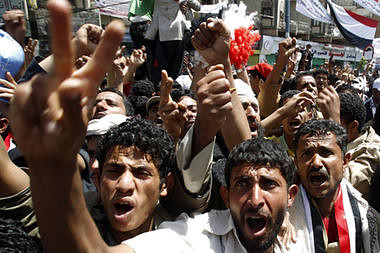
Yemen protesters demand changes in the U.S.-backed regime of President Saleh. Demonstrations have taken place over the last few months., a photo by Pan-African News Wire File Photos on Flickr.
Qatar quits Gulf plan for Yemen, cites delays
Thu, May 12 2011
By Mohammed Ghobari and Khaled al-Mahdy
SANAA/TAIZ (Reuters) - Qatar on Thursday pulled out of a Gulf-brokered plan to ease Yemen's president from power, leaving a deal to end months of violent protests against Ali Abdullah Saleh's rule close to collapse.
Qatar's withdrawal came just as the opposition said the Gulf Cooperation Council (GCC), of which it is a member, was sending its secretary-general to Yemen to revive the stalled deal.
The accord has been teetering on the brink of collapse for weeks as Saleh, a shrewd political survivor in power for 33 years, refused to sign the deal.
The plan was mainly backed by regional heavyweight Saudi Arabia to halt weeks of bloodshed, but the withdrawal of Qatar, which has mediated in several conflicts in the Middle East and Africa, was a further psychological blow.
"Qatar was forced to take this action because of the stalling in signing the proposed agreement ...the continued escalation, the intensity of the confrontations and a lack of wisdom," the Qatari state news agency QNA reported, citing a Foreign Ministry official.
Saleh has accused Qatar of funding the opposition in Yemen and said the gas-rich Gulf state's pan-Arab television channel Al Jazeera has provoked the protests.
Yemeni forces fired machineguns to halt a protest against Saleh on Thursday, wounding dozens in the southern city of Taiz and two protesters were killed in another southern city.
An opposition leader told Reuters that GCC Secretary-General Abdullatif al-Zayani would come to Sanaa on Saturday in a new attempt to revive the flagging initiative.
Zayani condemned the violence of recent days, part of a crackdown on three months of protests inspired by uprisings across the Arab world.
In a statement he called "on all sides to return to the Gulf initiative to solve the crisis, as it is the best exit to the tragic situation Yemen is living," he said in a statement.
A government official said only that Zayani would come at some point to hear differing views on the plan.
U.S.-based Human Rights Watch called for a promise of immunity for Saleh under the GCC deal to be withdrawn after the latest attacks on protesters.
"These attacks suggest that President Saleh views his promise of immunity as a "Get Out of Jail Free' card for political murder," the group's regional director Joe Stork said.
"The GCC member states and other governments involved in negotiations for President Saleh's exit should immediately pull immunity from the table," he said in a statement.
Security forces, using machineguns mounted on military vehicles, wounded dozens of protesters setting up roadblocks along a main street in the city of Taiz, 200 km (125 miles) south of Sanaa, a Reuters reporter said.
The injured were rushed to a clinic in a square where demonstrators have camped out for months. Leaders shouting on megaphones urged protesters to head to the main road to reinforce demonstrators as clashes continued.
In the southern city of al-Baydah, angry protesters attacked the ruling party building and set it ablaze after two demonstrators were shot dead by men in civilian clothes believed to be security officers, residents said.
Seven protesters were wounded, a witness said.
Washington and Gulf Arab states, especially neighboring oil giant Saudi Arabia, are worried that more chaos could give ample room for al Qaeda's aggressive Yemen-based wing to operate more freely, and have been eager to implement the Gulf-brokered deal.
Yemeni forces killed 13 protesters on Wednesday, bringing the overall death toll above 160, and raising fears of a broader conflict in a country where half the population owns a gun.
PRESSURE RISING
This week's bloodshed may fuel public rage before Friday, the Muslim day of prayer and traditionally the largest day of rallies in the three-month-old revolt against Saleh.
"The more the regime thinks it's reaching its end, the more it increases the violence against us, but we'll remain firm and we're not leaving," Sanaa protester Abdulkarim Mohammed said.
The defense ministry website said on Thursday Saleh planned to deploy military academy students to help security forces.
That may indicate he is running out of manpower to enforce his rule after recent political, tribal and military defections.
Protesters are ratcheting up pressure by trying to blockade or march on government buildings as they grow increasingly frustrated by their inability to dislodge Saleh.
Anti-Saleh tribesmen have blockaded the oil-producing Maarib province for weeks, creating a fuel crisis shipping sources say is costing Yemen $3 million a day in blocked exports.
But those pressures have hurt the local population just as much -- fuel shortages mean dry regions have not received water shipments and the capital Sanaa faces long power cuts.
Food and cooking gas prices have soared as 40 percent of the population of 23 million live on less than $2 a day and a third face chronic hunger.
(Additional reporting by Mohamed Sudam in Sanaa, and Avril Ormsby in London, and Isabel Cole in Cairo; writing by Erika Solomon and Firouz Sedarat; editing by Cynthia Johnston and David Stamp)
No comments:
Post a Comment